First All-Union Olympiad of Schoolchildren on Programming (Computer Science) 1988
This is the first publication about the first school programming / computer science Olympiad. The second will be about 1989.
1988 - First All-Union
1989 - First All-Russian
1989 - First International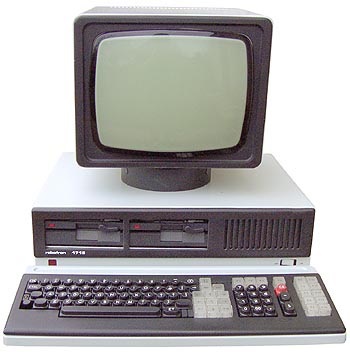
I invite all readers to try their hand at solving problems. (And let the students solve their problems)
1988 was the year of the loss of Yershov , Mitnick was undergoing treatment for computer addiction in a non-strict prison, Morris released his worm, the feds just took a breath after catching Poulsen , DARPA created a special division for computer security , German hackers conducted the fifth Chaos Communication Congress, my leg first entered the land of Moscow, in the USSR in Sverdlovsk (Yekaterinburg) the first All-Union School Olympiad in Informatics took place.
')
About the level of technology at that time post "Soviet personal computers"
On April 13-20, 80 schoolchildren from all the Union republics mastered the Robotron-1715 computers for 2 days ( on the right of the photo ), and then solved six problems.
The Olympiad consisted of two rounds - Theoretical (4 tasks) and Machine (2 tasks).
April 15th. It was carried out in writing, without access to the computer . 3.5 hours to complete assignments. Languages - Pascal, Rapier, Xi, Algol, Fortran, algorithmic language of the course of informatics, etc.
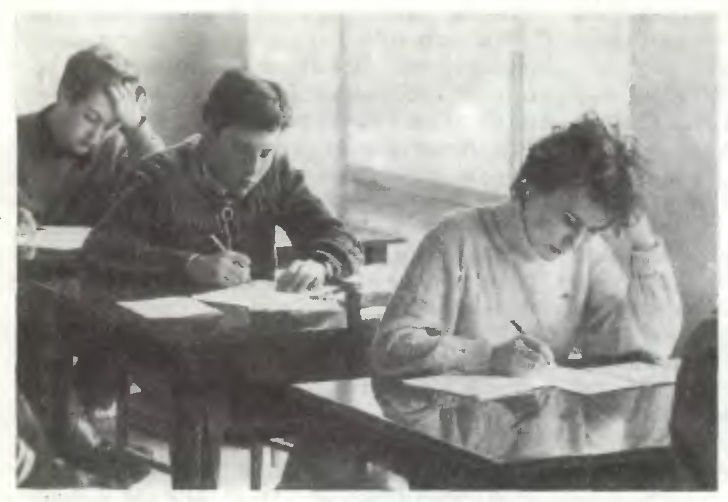
The task of creating an algorithm is considered solved if the presented algorithm is correct (satisfies all the requirements of the condition). The jury has the right to consider the problem unsolved if the algorithm is so complicated that the jury could not establish its correctness or incorrectness. Additional points can be awarded for the simplicity and originality of the algorithm, justification of its correctness, the presence of comments to facilitate its reading, as well as for the efficiency of the algorithm (short running time, small used memory). At the end of some tasks, the effectiveness of well-known jury algorithms is indicated; these instructions are not mandatory requirements. Evaluation can be reduced for serious syntactic errors in the recording algorithm, making it difficult to understand.
Task 1:
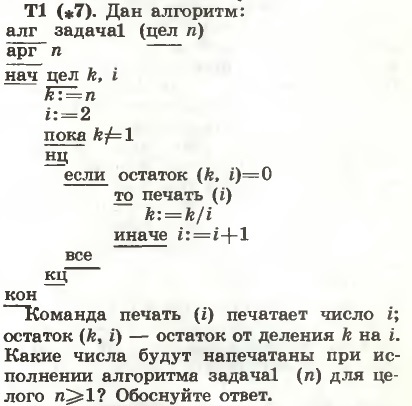
Task 2:

Task 3:
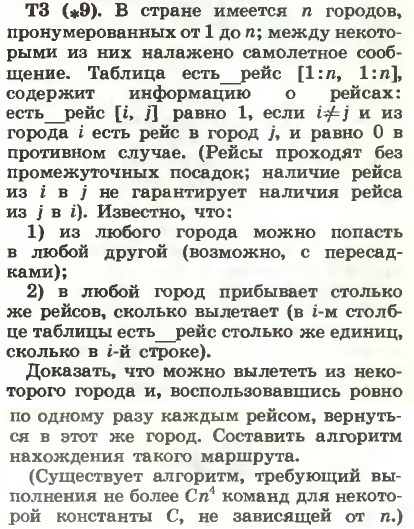
Task 4:

Valid programming languages were BASIC or Pascal.
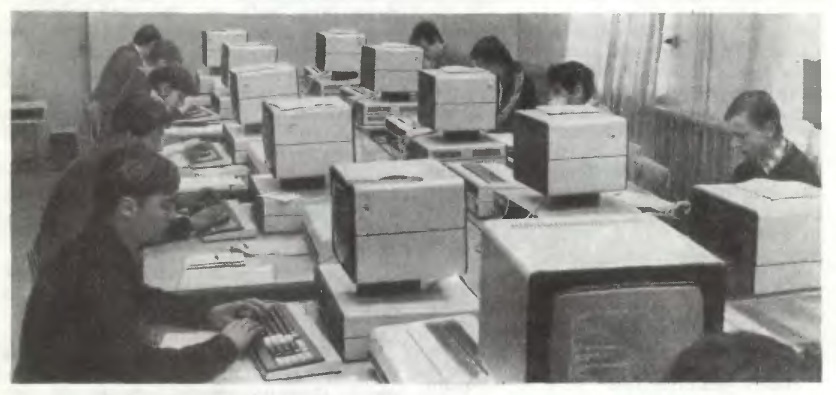
In tasks of a machine tour, the achieved result was evaluated, the use of a computer was only a means. Additional points were estimated presentation of the solution method, its rationale, comments on the program, etc.
Task 1:
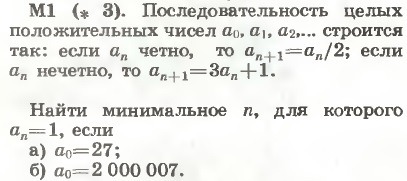
Task 2:
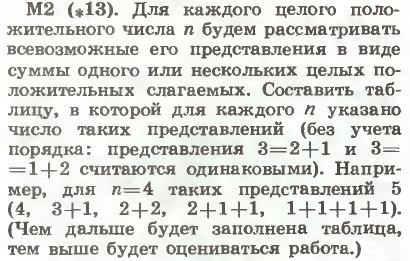
The analysis of tasks was carried out on April 18 in the morning, and in the evening there was an appeal.
The next day there was atorrent exchange of computer programs among the participants of the computer festival.
According to the results of the Olympiad, Alexander Vaschillo became the first champion (he lives in America, works in MS), a student of secondary school No. 239 in Leningrad. The second place went to Vadim Zavalishin ( seemingly how it works with sound , was mentioned in an article on Habré, his book ), a pupil of secondary school No. 524 at the Moscow Engineering Physics Institute, Moscow, and third place - Vyacheslav Kalashnikov from secondary school No. 57 of Moscow.



(I wonder if there are any of them in Habré)
Solutions once lay here
An article in the journal "Quantum"
1988 - First All-Union
1989 - First All-Russian
1989 - First International

I invite all readers to try their hand at solving problems. (And let the students solve their problems)
Context
1988 was the year of the loss of Yershov , Mitnick was undergoing treatment for computer addiction in a non-strict prison, Morris released his worm, the feds just took a breath after catching Poulsen , DARPA created a special division for computer security , German hackers conducted the fifth Chaos Communication Congress, my leg first entered the land of Moscow, in the USSR in Sverdlovsk (Yekaterinburg) the first All-Union School Olympiad in Informatics took place.
')
About the level of technology at that time post "Soviet personal computers"
On April 13-20, 80 schoolchildren from all the Union republics mastered the Robotron-1715 computers for 2 days ( on the right of the photo ), and then solved six problems.
The Olympiad consisted of two rounds - Theoretical (4 tasks) and Machine (2 tasks).
History and background of the Olympiad in Informatics
The Olympiad movement in computer science, in contrast to such subjects as mathematics, physics and chemistry, has a relatively recent history. Despite the fact that the first computer appeared in 1949, the understanding that with the development of computer technology comes the era of new information technologies, appeared only in the late 70s.
In the spring of 1985, the Party and Government Decree “On Measures to Ensure Computer Literacy of Secondary Schools and the Widespread Introduction of Electronic Computing Techniques to the Educational Process” was adopted, and in the fall of 1985, the basic principles of informatics and computing began in all schools of the country. technology.
Outstanding scientists Academicians A.P. Ershov, E.P. Velikhov, B.N. Naumov and others immediately joined the solution of the complex tasks of teaching school informatics. Due to this, in a relatively short period of time, groups have formed in the country, which could, relying on our entire educational, scientific, industrial and cultural computer infrastructure, solve the tasks set in education and in a short time.
The birth of computer science olympiads was the next important step in creating an infrastructure for teaching computer science at school, because for the intensive movement of the country in the direction of computerization of computer education was not enough. We also need highly qualified specialists who are able to develop the information technologies of tomorrow.
It is difficult to say now who first came up with the idea of holding All-Union Olympiads for schoolchildren in computer science, but it is quite obvious that such an interesting and rapidly developing subject could not remain without an Olympiad for a long time. In the fall of 1987, the first organizational meeting was held at the USSR Ministry of Education, which was attended by Academicians A.P. Ershov, N.N. Krasovsky, Doctor of Physics and Mathematics. A.L.Semenov, Ph.D. Associate Professor V.M. Kiryukhin, as well as a representative of the Ministry and a member of the Central Organizing Committee of the All-Union School Olympiad, T.A.Sarycheva. At the meeting it was decided to hold the first in-country computer science Olympiad in the spring of 1988 in Sverdlovsk, now Yekaterinburg.
Sverdlovsk was not accidentally selected as the city of the first Olympiad: at that time, many schools in the city and Sverdlovsk region had already been supplied with personal computers "Robotron-1715", a modern program for that time and textbooks for teaching school informatics was developed.
At the first organizational meeting, the Regulation on the Olympiad in Informatics was also agreed upon and the chairmen of the program committee and the jury were appointed. Academician A.P. Ershov became chairman of the program committee, Academician N.N. Krasovsky became chairman of the jury.
The first Olympiad in Informatics, held from April 13 to April 20, 1988 in Sverdlovsk, was called not All-Russian yet, but All-Union, in which 80 schoolchildren from all the Union republics took part.
At that time, experience in organizing such competitions was not in the country or in the world. In order to determine the methodology and content of informatics olympiads, the best specialists in the field of school informatics and the olympiad movement, one representative from each union republic and each territory of the Russian Federation, were invited as members of the jury. As a result of long disputes and discussions, the rules that formed the basis of the rules for holding modern competitions have been gradually formed.
The quantitative composition of the participants of the first Olympiads was determined taking into account the available possibilities in providing computers and proportionally to the number of schoolchildren in the Union republics and territories of the Russian Federation.
Starting with the III All-Union Olympiad, held in 1990 in Kharkov, it was decided to hold both rounds of the Olympiad using computers. Prior to this, the first round was theoretical, without the use of computers, the second round was practical.
The Olympiad, which took place in 1992 in the city of Mogilev, was called the Interstate, and was attended by schoolchildren from almost all states formed after the collapse of the USSR.
Simultaneously with the All-Union from 1989 to 1991, the All-Russian Olympiads were held, which were the republican stage of the All-Union Olympiad. Since 1992, they began to be held in the same format as the All-Union Olympiads in Informatics.
In 1992, a new Regulation on All-Russian School Olympiads was adopted, according to which the third stage was conducted by the educational authorities of the constituent entities of the Russian Federation, and the final stage - by the Ministry of Education of the Russian Federation. The winners of the third stage of the Olympiad of all subjects of the Russian Federation were invited immediately to participate in the final stage of the Olympiad.
In 1992-1996, the capital of the olympiad movement in computer science was the city of Troitsk, Moscow Region, which was associated with the presence of the specialized Trinity computer science center “Baitik” there and, as a result, with good computer equipment. In 1997-1999, the final stage of the Olympiad was held in St. Petersburg. In subsequent years, the successful development of the country's economy and the increased attention of federal and regional education authorities to the issues of informatization of education significantly expanded the geography of the final stage of All-Russian Olympiads in Informatics: from 2000 to 2005, the Olympics were held in the cities of Troitsk, Yekaterinburg, Perm, St. Petersburg , Tver region and Novosibirsk.
During the international and All-Russian Olympiads in informatics and programming for schoolchildren and students, a great deal of organizational experience has been accumulated, and various links have been established in the system of training gifted young specialists in the field of informatics and information technologies that make a significant contribution to the development of informatization of the country. High-class specialists and teachers work with the guys who are focused not only on the immediate result, that is, on prizes for their wards, but also on the long-term perspective - on educating the future shift of specialists in the field of information technologies and programming.
The permanent chairman of the Central Methodical Commission on Informatics is V.M. Kiryukhin. The oldest members of this commission are famous scientists and teachers in the field of school and olympiad informatics - professors S.M. Okulov, V.V.Prokhorov, I.V. Romanovsky, associate professors A.V. Alekseev, S.V. Volchenkov, E.V. Andreeva, V.D.Lelyukh.
old.info.rosolymp.ru/default.asp?trID=96
In the spring of 1985, the Party and Government Decree “On Measures to Ensure Computer Literacy of Secondary Schools and the Widespread Introduction of Electronic Computing Techniques to the Educational Process” was adopted, and in the fall of 1985, the basic principles of informatics and computing began in all schools of the country. technology.
Outstanding scientists Academicians A.P. Ershov, E.P. Velikhov, B.N. Naumov and others immediately joined the solution of the complex tasks of teaching school informatics. Due to this, in a relatively short period of time, groups have formed in the country, which could, relying on our entire educational, scientific, industrial and cultural computer infrastructure, solve the tasks set in education and in a short time.
The birth of computer science olympiads was the next important step in creating an infrastructure for teaching computer science at school, because for the intensive movement of the country in the direction of computerization of computer education was not enough. We also need highly qualified specialists who are able to develop the information technologies of tomorrow.
It is difficult to say now who first came up with the idea of holding All-Union Olympiads for schoolchildren in computer science, but it is quite obvious that such an interesting and rapidly developing subject could not remain without an Olympiad for a long time. In the fall of 1987, the first organizational meeting was held at the USSR Ministry of Education, which was attended by Academicians A.P. Ershov, N.N. Krasovsky, Doctor of Physics and Mathematics. A.L.Semenov, Ph.D. Associate Professor V.M. Kiryukhin, as well as a representative of the Ministry and a member of the Central Organizing Committee of the All-Union School Olympiad, T.A.Sarycheva. At the meeting it was decided to hold the first in-country computer science Olympiad in the spring of 1988 in Sverdlovsk, now Yekaterinburg.
Sverdlovsk was not accidentally selected as the city of the first Olympiad: at that time, many schools in the city and Sverdlovsk region had already been supplied with personal computers "Robotron-1715", a modern program for that time and textbooks for teaching school informatics was developed.
At the first organizational meeting, the Regulation on the Olympiad in Informatics was also agreed upon and the chairmen of the program committee and the jury were appointed. Academician A.P. Ershov became chairman of the program committee, Academician N.N. Krasovsky became chairman of the jury.
The first Olympiad in Informatics, held from April 13 to April 20, 1988 in Sverdlovsk, was called not All-Russian yet, but All-Union, in which 80 schoolchildren from all the Union republics took part.
At that time, experience in organizing such competitions was not in the country or in the world. In order to determine the methodology and content of informatics olympiads, the best specialists in the field of school informatics and the olympiad movement, one representative from each union republic and each territory of the Russian Federation, were invited as members of the jury. As a result of long disputes and discussions, the rules that formed the basis of the rules for holding modern competitions have been gradually formed.
The quantitative composition of the participants of the first Olympiads was determined taking into account the available possibilities in providing computers and proportionally to the number of schoolchildren in the Union republics and territories of the Russian Federation.
Starting with the III All-Union Olympiad, held in 1990 in Kharkov, it was decided to hold both rounds of the Olympiad using computers. Prior to this, the first round was theoretical, without the use of computers, the second round was practical.
The Olympiad, which took place in 1992 in the city of Mogilev, was called the Interstate, and was attended by schoolchildren from almost all states formed after the collapse of the USSR.
Simultaneously with the All-Union from 1989 to 1991, the All-Russian Olympiads were held, which were the republican stage of the All-Union Olympiad. Since 1992, they began to be held in the same format as the All-Union Olympiads in Informatics.
In 1992, a new Regulation on All-Russian School Olympiads was adopted, according to which the third stage was conducted by the educational authorities of the constituent entities of the Russian Federation, and the final stage - by the Ministry of Education of the Russian Federation. The winners of the third stage of the Olympiad of all subjects of the Russian Federation were invited immediately to participate in the final stage of the Olympiad.
In 1992-1996, the capital of the olympiad movement in computer science was the city of Troitsk, Moscow Region, which was associated with the presence of the specialized Trinity computer science center “Baitik” there and, as a result, with good computer equipment. In 1997-1999, the final stage of the Olympiad was held in St. Petersburg. In subsequent years, the successful development of the country's economy and the increased attention of federal and regional education authorities to the issues of informatization of education significantly expanded the geography of the final stage of All-Russian Olympiads in Informatics: from 2000 to 2005, the Olympics were held in the cities of Troitsk, Yekaterinburg, Perm, St. Petersburg , Tver region and Novosibirsk.
During the international and All-Russian Olympiads in informatics and programming for schoolchildren and students, a great deal of organizational experience has been accumulated, and various links have been established in the system of training gifted young specialists in the field of informatics and information technologies that make a significant contribution to the development of informatization of the country. High-class specialists and teachers work with the guys who are focused not only on the immediate result, that is, on prizes for their wards, but also on the long-term perspective - on educating the future shift of specialists in the field of information technologies and programming.
The permanent chairman of the Central Methodical Commission on Informatics is V.M. Kiryukhin. The oldest members of this commission are famous scientists and teachers in the field of school and olympiad informatics - professors S.M. Okulov, V.V.Prokhorov, I.V. Romanovsky, associate professors A.V. Alekseev, S.V. Volchenkov, E.V. Andreeva, V.D.Lelyukh.
old.info.rosolymp.ru/default.asp?trID=96
Theoretical tour
April 15th. It was carried out in writing, without access to the computer . 3.5 hours to complete assignments. Languages - Pascal, Rapier, Xi, Algol, Fortran, algorithmic language of the course of informatics, etc.

The task of creating an algorithm is considered solved if the presented algorithm is correct (satisfies all the requirements of the condition). The jury has the right to consider the problem unsolved if the algorithm is so complicated that the jury could not establish its correctness or incorrectness. Additional points can be awarded for the simplicity and originality of the algorithm, justification of its correctness, the presence of comments to facilitate its reading, as well as for the efficiency of the algorithm (short running time, small used memory). At the end of some tasks, the effectiveness of well-known jury algorithms is indicated; these instructions are not mandatory requirements. Evaluation can be reduced for serious syntactic errors in the recording algorithm, making it difficult to understand.
Task 1:

Task 2:

Task 3:

Task 4:

Machine Tour
Valid programming languages were BASIC or Pascal.

In tasks of a machine tour, the achieved result was evaluated, the use of a computer was only a means. Additional points were estimated presentation of the solution method, its rationale, comments on the program, etc.
Task 1:

Task 2:

The analysis of tasks was carried out on April 18 in the morning, and in the evening there was an appeal.
The next day there was a
Prize winners
According to the results of the Olympiad, Alexander Vaschillo became the first champion (he lives in America, works in MS), a student of secondary school No. 239 in Leningrad. The second place went to Vadim Zavalishin ( seemingly how it works with sound , was mentioned in an article on Habré, his book ), a pupil of secondary school No. 524 at the Moscow Engineering Physics Institute, Moscow, and third place - Vyacheslav Kalashnikov from secondary school No. 57 of Moscow.



(I wonder if there are any of them in Habré)
Solutions once lay here
An article in the journal "Quantum"
Source: https://habr.com/ru/post/235089/
All Articles